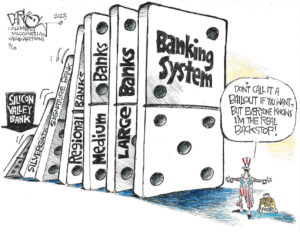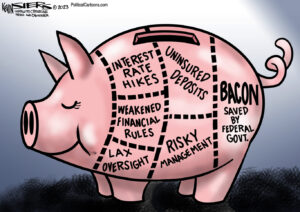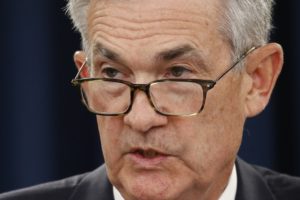So Much for the ‘Masters of the Universe’
Let's be clear about why we're facing a crisis that could pull down the global financial system. The irresponsibility of individuals who bought houses they couldn't quite afford pales in comparison to the irresponsibility of the financial wizards who built on those shaky mortgages a towering edifice of irrational faith.The über-capitalists of Wall Street are all socialists now. Free-market ideology, it turns out, doesn’t pay the mortgage. That appears to be a job for, ahem, Big Government.
Let’s be clear about why we’re facing a crisis that could pull down the global financial system. The irresponsibility of individuals who bought houses they couldn’t quite afford pales in comparison to the irresponsibility of the financial wizards who built on those shaky mortgages a towering edifice of irrational faith. Someone in the government should have looked at all those trillions of dollars worth of mortgage-backed securities and collateralized debt obligations and credit default swaps and demanded that Wall Street prove that all, or even most, of this purported money was real. But we’re in the eighth year of the Bush administration; adult supervision left the building long ago.
Now that the whole highly leveraged structure is threatening to fall, some kind of government bailout is necessary and inevitable. But Congress shouldn’t approve Treasury Secretary Henry Paulson’s $700-billion rescue plan without insisting on some measure of equity and accountability.
See, neglecting such details as equity — in both senses of the word — and accountability is what got us here in the first place.
Congress should have learned by now what happens when this administration is given a blank check. Unlike the run-up to the Iraq war, at least this time there’s a genuine emergency — we came within a whisker of a financial meltdown last week, and we’re still way deep in the woods. No one thinks that delay is an option.
Not Barack Obama, who introduced legislation in 2006 to address lax mortgage lending practices and in March proposed a new regulatory framework for the financial markets. Not John McCain, who has been all over the map. Within one week, McCain has gone from saying the “fundamentals of the economy are strong” to declaring that “we are in the most serious crisis since World War II.”
But first we need to be convinced that Paulson’s proposal — have the government purchase the bad debt — is the best thing to do. Not all economists believe it is, although it’s true that if you put six economists in a room they’ll come up with seven sharply differing, strongly held points of view about the time of day. Assuming that Paulson’s plan is deemed workable, the “details” yet to be worked out involve staggering amounts of money. Hedge funds apparently don’t qualify for relief, but what about insurance companies that branched out into exotic mortgage-backed investments? What about foreign banks with big U.S. operations?
Clearly there has to be some definition of just who is covered, and there has to be some oversight. And now that the government has nationalized Fannie Mae and Freddie Mac, who’s going to run those still-crucial institutions? Who’s going to run the giant insurance company AIG, which was effectively nationalized last week?
Maybe Congress can insert a provision that broadly insists on the principle of oversight and leaves the particulars to be worked out later. But it would be unconscionable for Congress to absolve a bunch of wealthy financiers from the consequences of their bad decisions and not do the same for homeowners who showed similarly poor judgment. Paulson has indicated his awareness that this is, indeed, an election year — and that members of Congress are not eager to go home to their districts and explain why Wall Street pooh-bahs get to keep their mansions and their yachts while working-class families lose their modest homes.
The more contentious issue is the idea, supported thus far mostly by Democrats on Capitol Hill, that there should be salary caps for executives of companies that take advantage of the government bailout. Paulson complains that this would provide a disincentive for companies to participate in the program — whatever the program turns out to be — but it seems to me to be a reasonable idea, and a winner politically.
Why shouldn’t the executives who put their companies at risk by making unwise investments pay a price for their lack of prudence?
We can’t just let the system collapse — nobody wins in that event. But I thought one of the fundamental tenets of capitalism was a direct relationship between risk and reward. The Masters of the Universe who created this mess ought to share the pain of cleaning it up.
Eugene Robinson’s e-mail address is eugenerobinson(at)washpost.com.
© 2008, Washington Post Writers Group
Your support matters…Independent journalism is under threat and overshadowed by heavily funded mainstream media.
You can help level the playing field. Become a member.
Your tax-deductible contribution keeps us digging beneath the headlines to give you thought-provoking, investigative reporting and analysis that unearths what's really happening- without compromise.
Give today to support our courageous, independent journalists.




You need to be a supporter to comment.
There are currently no responses to this article.
Be the first to respond.